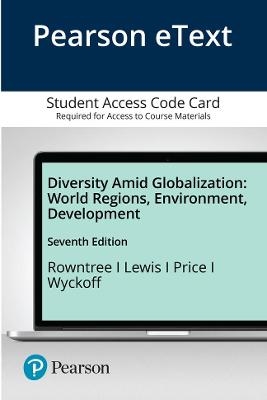
Diversity Amid Globalization
Pearson (Hersteller)
978-0-13-485724-4 (ISBN)
- Titel z.Zt. nicht lieferbar
- Versandkostenfrei innerhalb Deutschlands
- Auch auf Rechnung
- Verfügbarkeit in der Filiale vor Ort prüfen
- Artikel merken
Diversity Amid Globalization uses interactive learning tools to take students on a journey through the diverse regions of the world. The 7th Edition supports the most comprehensive world regional program, helping students explore the various sights, sounds, and tastes of different parts of the world. With deeper mobile integration, instructors can use web maps, video tours, and geoscience animations to enhance students' virtual, active learning experience. Links and online supplements provide insight into world regional geography, including explorations of space, language, music, and cooking traditions. Focusing on globalization, the text's arresting visual layout and updated content combine to give students an accurate portrayal of the world's evolving regional landscapes.
For introductory courses in world regional and regional geography.
Pearson eText is an easy-to-use digital textbook that you can purchase on your own or instructors can assign for their course. The mobile app lets you keep on learning, no matter where your day takes you — even offline. You can also add highlights, bookmarks, and notes in your Pearson eText to study how you like.
NOTE: This ISBN is for the Pearson eText access card. Pearson eText is a fully digital delivery of Pearson content. Before purchasing, check that you have the correct ISBN. To register for and use Pearson eText, you may also need a course invite link, which your instructor will provide. Follow the instructions provided on the access card to learn more.
Les Rowntree is a Research Associate at the University of California, Berkeley, where he researches and writes about global and local environmental issues. This career change came after more than three decades teaching both Geography and Environmental Studies at San Jose State University. As an environmental geographer, Dr. Rowntree’s interests focus on international environmental issues, biodiversity conservation, and human-caused global change. He sees world regional geography as a way to engage and inform students by giving them the conceptual tools needed to critically assess the contemporary world. His current research and writing projects include a natural history book on California’s Coast Range and essays on Europe’s environmental issues; additionally, he maintains an assortment of web-based natural history, geography, and environmental blogs and websites. Martin Lewis is a Senior Lecturer in History at Stanford University, where he teaches courses on global geography. He has conducted extensive research on environmental geography in the Philippines and on the intellectual history of world geography. His publications include Wagering the Land: Ritual, Capital, and Environmental Degradation in the Cordillera of Northern Luzon, 1900–1986 (1992), and, with Karen Wigen, The Myth of Continents: A Critique of Metageography (1997). Dr. Lewis has traveled extensively in East, South, and Southeastern Asia. His current research focuses on the geography of languages. In April 2009, Dr. Lewis was recognized by Time magazine as one of America’s most favorite lecturers. Marie Price is a Professor of Geography and International Affairs at George Washington University. A Latin American specialist, Dr. Price has conducted research in Belize, Mexico, Venezuela, Panama, Cuba, and Bolivia. She has also traveled widely throughout Latin America and Sub-Saharan Africa. Her studies have explored human migration, natural resource use, environmental conservation, and sustainability. In 2016 she became the President of the American Geographical Society, the oldest national geography organization in the country dedicated to the advancement of geographic research for a more sustainable future. Dr. Price brings to Diversity Amid Globalization a special interest in regions as dynamic spatial constructs that are shaped over time through both global and local forces. Her publications include the co-edited book Migrants to the Metropolis: The Rise of Immigrant Gateway Cities (2008) and numerous academic articles and book chapters. William Wyckoff is a Professor of Geography in the Department of Earth Sciences at Montana State University, specializing in the cultural and historical geography of North America. He has written and co-edited several books on North American settlement geography, including The Developer’s Frontier: The Making of the Western New York Landscape (1988), The Mountainous West: Explorations in Historical Geography (1995) (with Lary M. Dilsaver), Creating Colorado: The Making of a Western American Landscape 1860–1940 (1999), and On the Road Again: Montana’s Changing Landscape (2006). His most recent book, How to Read the American West: A Field Guide, appeared in the Weyerhaeuser Environmental Books series and was published in 2014 by the University of Washington Press. A World Regional Geography instructor for 27 years, Dr. Wyckoff emphasizes in the classroom the connections between the everyday lives of his students and the larger global geographies that surround them and increasingly shape their future.
1. Concepts of World Geography
2. Physical Geography and the Environment
3. North America
4. Latin America
5. The Caribbean
6. Sub-Saharan Africa
7. Southwest Asia and North Africa
8. Europe
9. The Russian Domain
10. Central Asia
11. East Asia
12. South Asia
13. Southeast Asia
14. Australia and Oceania
| Erscheint lt. Verlag | 22.9.2020 |
|---|---|
| Sprache | englisch |
| Maße | 216 x 279 mm |
| Gewicht | 43 g |
| Themenwelt | Naturwissenschaften ► Geowissenschaften ► Geografie / Kartografie |
| ISBN-10 | 0-13-485724-0 / 0134857240 |
| ISBN-13 | 978-0-13-485724-4 / 9780134857244 |
| Zustand | Neuware |
| Informationen gemäß Produktsicherheitsverordnung (GPSR) | |
| Haben Sie eine Frage zum Produkt? |